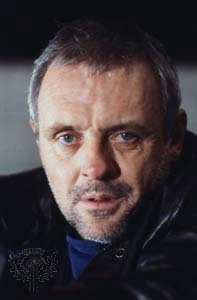Hopkins, Sir Anthony
British actor
in full Philip Anthony Hopkins
born December 31, 1937, Port Talbot, West Glamorgan, Wales
Welsh stage and film actor of burning intensity, often seen at his best when playing pathetic misfits or characters on the fringes of insanity.
Hopkins had early ambitions to be a concert pianist. He began acting at age 18, when he joined a YMCA dramatic club. He received a scholarship to the Cardiff College of Music and Drama, and he toured with the Arts Council as a stage manager and actor after his graduation, then spent two years with the Royal Artillery. Upon his demobilization he resumed his acting career, making his professional debut in 1960. A self-described “actor of instinct,” he gained needed training by enrolling at the Royal Academy of Dramatic Art in 1961, graduating as a silver medalist two years later. He first appeared on the London stage in Lindsay Anderson (Anderson, Lindsay)'s production of Julius Caesar (1964). It was during this period that he appeared in his first film, the Anderson-directed short subject The White Bus (released in 1967).
Accepted into Laurence Olivier (Olivier, Laurence, Baron Olivier of Brighton)'s National Shakespeare Company in 1965, he understudied Olivier in several productions before attracting critical attention with his performances as Edgar in The Dance of Death and Andrey Prosorov in The Three Sisters (both 1967). At last attracting the attention of the critics, he soon found himself being promoted as the “new Olivier,” and it was during this initial burst of adulation that he landed the juicy role of Prince Richard Plantagenet in the 1968 film version of The Lion in Winter. In 1974 he enjoyed a double professional triumph when he starred in the American television miniseries QB VII and also played the role of Dr. Martin Dysart in the original Broadway production of Equus.
 Despite years of promise and glowing reviews, Hopkins found his career impeded by his recalcitrant attitude and battles with alcoholism. After waking up in a Phoenix, Arizona, hotel room in 1975 and not being able to remember how he got there, Hopkins resolved to reform: “I led a pretty self-destructive life for a few decades. It was only after I put my demons behind me that I was able to fully enjoy acting.” His career gained momentum, and his subsequent film and TV credits included his Emmy-winning performances as Bruno Richard Hauptmann in The Lindbergh Kidnapping Case (1976) and as Adolf Hitler in The Bunker (1981), as well as his sharply etched portrayals of two roles previously associated with Charles Laughton (Laughton, Charles): Quasimodo in The Hunchback of Notre Dame (1982) and Captain Bligh in The Bounty (1984). In 1979 he won a Golden Globe nomination for his performance as a schizophrenic ventriloquist in the American film Magic (1978), and in 1989 he made his West End stage debut in the musical drama M. Butterfly.
Despite years of promise and glowing reviews, Hopkins found his career impeded by his recalcitrant attitude and battles with alcoholism. After waking up in a Phoenix, Arizona, hotel room in 1975 and not being able to remember how he got there, Hopkins resolved to reform: “I led a pretty self-destructive life for a few decades. It was only after I put my demons behind me that I was able to fully enjoy acting.” His career gained momentum, and his subsequent film and TV credits included his Emmy-winning performances as Bruno Richard Hauptmann in The Lindbergh Kidnapping Case (1976) and as Adolf Hitler in The Bunker (1981), as well as his sharply etched portrayals of two roles previously associated with Charles Laughton (Laughton, Charles): Quasimodo in The Hunchback of Notre Dame (1982) and Captain Bligh in The Bounty (1984). In 1979 he won a Golden Globe nomination for his performance as a schizophrenic ventriloquist in the American film Magic (1978), and in 1989 he made his West End stage debut in the musical drama M. Butterfly.While critical acclaim has been lavished upon Hopkins's rich, full-blooded characterizations of such real-life personalities as Yitzhak Rabin, John Quincy Adams, Richard Nixon, C.S. Lewis, and Pablo Picasso, the film role with which he is most identified, and for which he received an Academy Award, was that of the horrifyingly brilliant serial killer Hannibal (“the Cannibal”) Lecter in The Silence of the Lambs (1991). He received subsequent Oscar nominations for his roles as a duty-bound butler in Remains of the Day (1993), as Richard M. Nixon (Nixon, Richard M.) in Nixon (1995), and as John Quincy Adams (Adams, John Quincy) in Amistad (1997).
Hopkins continued his prolific acting career in Hannibal (2001) and Red Dragon (2002), where he revived his Oscar-winning portrayal of Hannibal Lecter. He starred opposite Gwyneth Paltrow as a brilliant mathematician afflicted with mental illness in Proof (2005). In 2006 Hopkins appeared in Bobby, about the day of Robert F. Kennedy (Kennedy, Robert F.)'s assassination, and in All the King's Men, based on the novel by Robert Penn Warren (Warren, Robert Penn). The following year he played Hrothgar in Beowulf (2007). Hopkins was knighted in 1993.
Additional Reading
Michael Feeney Callan, Anthony Hopkins: In Darkness and Light (1993; also published as Anthony Hopkins: The Unauthorized Biography, 1994); Quentin Falk, Anthony Hopkins: The Authorized Biography (1993, reissued 2000).
- Frankie, and the Teenagers Lymon
- Frankie Avalon
- Frankie Lymon, and the Teenagers
- Frankie Yale
- Frank, Ilya Mikhaylovich
- frankincense
- Frank, Jacob
- Frank James, Jesse; and James
- Frank, Johann Peter
- Frank J(ohnson) Goodnow
- Frank, Karl Hermann
- Frank King
- Frank Knox
- Frank Kobina Parkes
- Frankland, Agnes Surriage, Lady
- Frankland, Sir Edward
- Frank Leahy
- Frank, Leonhard
- Franklin
- Franklin and Marshall College
- Franklin, Aretha
- Franklin, Benjamin
- Franklin Benjamin Sanborn
- Franklin Buchanan
- Franklin Chang-Díaz